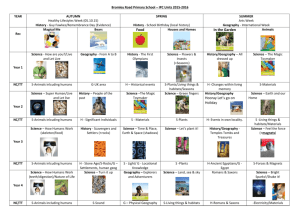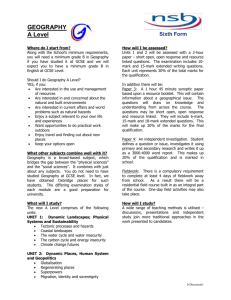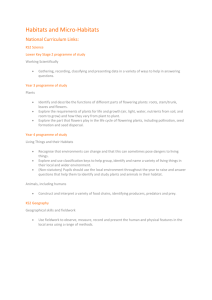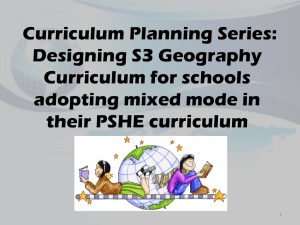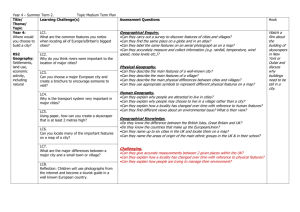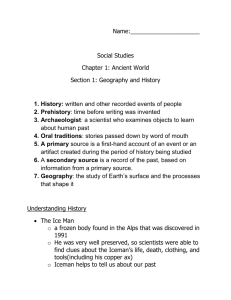Year 2 Overview - Torkington Primary School
advertisement
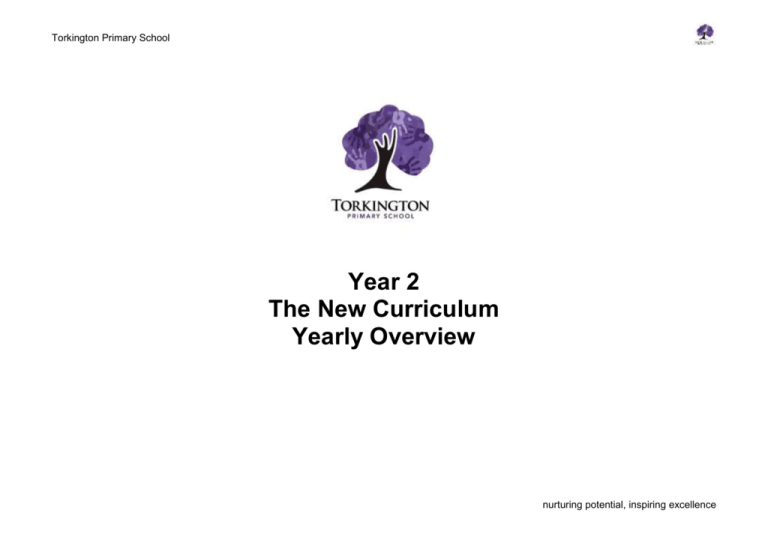
Torkington Primary School Year 2 The New Curriculum Yearly Overview nurturing potential, inspiring excellence Torkington Primary School Autumn 1 Topic: Land Ahoy / Titanic Subject Driver: Geography Science Working Scientifically. asking simple questions and recognising that they can be answered in different ways observing closely, using simple equipment performing simple tests identifying and classifying using their observations and ideas to suggest answers to questions Gathering and recording data to help in answering questions. Physics – movement – Non Statutory Notice and describe how things move faster, slower, turning and spinning. Compare how different things move History Titanic Project NC Events beyond living memory that are significant nationally or globally Significant historical events, people and places in their own locality. Skills To investigate and interpret the past: Ask questions such as what was it like for people? What happened? How long ago? To build an overview of world history: Describe historical events Recognise that there are reasons why people in the past acted as they did To understand chronology: Use dates where appropriate Place events and artefacts in order on a time line. Computing understand what algorithms are; how they are implemented as programs on digital devices; and that programs execute by following precise and unambiguous instructions Use technology safely and respectfully, keeping personal information private; identify where to go for help and support when they have concerns about content or contact on the internet or other online technologies.(All terms) Design and Technology Wheels and Axles Prior learning • Assembled vehicles with moving wheels using construction kits. • Explore moving vehicles through play. • Gained some experience of designing, making and evaluating products for a specified user and purpose. • Developed some cutting, joining and finishing skills with card. Designing • Generate initial ideas and simple design criteria through talking and using own experiences. • Develop and communicate ideas through drawings and mock-ups. Making • Select from and use a range of tools and equipment to perform practical tasks such as cutting and joining to allow movement and finishing. • Select from and use a range of materials and components such as paper, card, plastic and wood according to their characteristics. Evaluating • Explore and evaluate a range of products with wheels and axles. • Evaluate their ideas throughout and their products against original criteria. Technical knowledge and understanding • Explore and use wheels, axles and axle holders. • Distinguish between fixed and freely moving axles. • Know and use technical vocabulary relevant to the project. Writing Postcards from a pirate ship Treasure Island Black Beard Non- chronological reports – non- fiction booklet (glossaries, labels, diagrams captions) Poetry – shape Music Children should be inspired to develop a love of music that increases their self-confidence creativity and sense of achievement. The music curriculum is a spiral curriculum, with key skills being repeated constantly Rhythm Copy rhythmic phrases with changing dynamics Clap the pulse/rhythm of a song Clap a given ostinato Clap the rhythm of a song whilst others tap the pulse Read simple notation (crotchets and quavers) PSHE/SRE SEAL: Belonging to the class / community. Friendships. Managing/exploring feelings SRE: Friendship, Family & Feelings – who is special to me. DATE: Types of medicine in the home / where they are kept. HEALTHY LIFESTYLES: Recognising the different ways to exercise, such as skipping. Personal hygiene eg oral hygiene and hand washing. ABC – ANTI-BULLYING,CELEBRATING DIFFERENCE E-safety Geography NC - Locational knowledge name and locate the world’s seven continents and five oceans Place knowledge understand geographical similarities and differences through studying the human and physical geography of a small area of the United Kingdom, and of a small area in a contrasting non-European country Geographical skills and fieldwork use world maps, atlases and globes to identify the United Kingdom and its countries, as well as the countries, continents and oceans studied at this key stage use simple compass directions (North, South, East and West) and locational and directional language [for example, near and far; left and right], to describe the location of features and routes on a map Skills To investigate places Use world maps, atlases and globes to identify the United Kingdom and its countries, as well as the countries, continents and oceans studied Name and locate the world’s continents and oceans To investigate patterns Understand geographical similarities and differences through studying the human and physical geography of a small area of the United Kingdom and of a contrasting non-European country. To communicate geographically Use compass directions (north, south, east and west) and locational language (e.g. near and far) to describe the location of features and routes on a map MFL Art NC - Pupils should be taught: to use a range of materials creatively to design and make products to use drawing, painting and sculpture to develop and share their ideas, experiences and imagination to develop a wide range of art and design techniques in using colour, pattern, texture, line, shape, form and space About the work of a range of artists, craft makers and designers, describing the differences and similarities between different practices and disciplines, and making links to their own work. Focus: Collage – water and the ocean Skills Use a combination of materials that are cut and torn and glued Sort and arrange materials Mix materials to create texture RE New Year – Divali To understand Divali as a New Year festival To become familiar with some of the ways in which Divali is celebrated To consider their feelings about the new school year. To consider how the New Year is celebrated within their own homes Games NON STATUTORY nurturing potential, inspiring excellence Torkington Primary School Autumn 2 Topic: Scrap Heap Challenge Science Subject Driver: Science /Citizenship / Environment History Geography NC Use basic geographical vocabulary to refer to: key physical features, including: beach, cliff, coast, forest, hill, mountain, sea, ocean, river, soil, valley, vegetation, season and weather key human features, including: city, town, village, factory, farm, house, office, port, harbour and shop Geographical skills and fieldwork use aerial photographs and plan perspectives to recognise landmarks and basic human and physical features; devise a simple map; and use and construct basic symbols in a key Use simple fieldwork and observational skills to study the geography of their school and its grounds and the key human and physical features of its surrounding environment. Skills - Care for our Local Area To investigate places Use simple field work and observation skills to study the geography of the school and the key human and physical features of its surrounding To communicate geographically devise a simple map and use and construct basic symbols in a key use simple grid references Working Scientifically. asking simple questions and recognising that they can be answered in different ways observing closely, using simple equipment performing simple tests identifying and classifying using their observations and ideas to suggest answers to questions Gathering and recording data to help in answering questions. Uses of everyday materials Identify and compare the suitability of a variety of everyday materials, including wood, metal, plastic, glass, rock paper and cardboard for particular uses. Find out how shapes of solid objects made from some materials can be changed by squashing, bending, twisting and stretching. Computing create and debug simple programs Use technology safely and respectfully, keeping personal information private; identify where to go for help and support when they have concerns about content or contact on the internet or other online technologies. Design and Technology Design and Technology Scheme of Work Focus: Textiles – templates and joining techniques. – recycled purses/ bags/ calendars Prior learning • Explored and used different fabrics. • Cut and joined fabrics with simple techniques. • Thought about the user and purpose of products. Designing • Design a functional and appealing product for a chosen user and purpose based on simple design criteria. • Generate, develop, model and communicate their ideas as appropriate through talking, drawing, templates, mock-ups and information and communication technology. Making • Select from and use a range of tools and equipment to perform practical tasks such as marking out, cutting, joining and finishing. • Select from and use textiles according to their characteristics. Evaluating • Explore and evaluate a range of existing textile products relevant to the project being undertaken. • Evaluate their ideas throughout and their final products against original design criteria. Technical knowledge and understanding • Understand how simple 3-D textile products are made, using a template to create two identical shapes. • Understand how to join fabrics using different techniques e.g. running stitch, glue, over stitch, stapling. • Explore different finishing techniques e.g. using painting, fabric crayons, stitching, sequins, buttons and ribbons. Art NC - Pupils should be taught: to use a range of materials creatively to design and make products to use drawing, painting and sculpture to develop and share their ideas, experiences and imagination to develop a wide range of art and design techniques in using colour, pattern, texture, line, shape, form and space About the work of a range of artists, craft makers and designers, describing the differences and similarities between different practices and disciplines, and making links to their own work. Focus: Sculpture Skills Use a combination of shapes Include lines and texture Use rolled up paper, straws and clay as materials Use techniques such as rolling, cutting, moulding and carving Focus Sewing – Christmas Calendars Join materials using glue or a stitch . Writing Narrative – stories with familiar settings Stig of the Dump Poetry - pattern – acrostic / repeating line / rhyme Recount PSHE/SRE SEAL: Friendship. Managing anger. Seeing another point of view. RSE: Friendship, Family & Feelings – Managing feelings. Peer pressure and stereotyping. DATE: People who are special to me. ABC – ANTI-BULLYING,CELEBRATING DIFFERENCE Generic GLOBAL/CITIZENSHIP: Celebrating different cultures. Multicultural understanding. • Know and use technical vocabulary relevant to the project Music Children should be inspired to develop a love of music that increases their self-confidence creativity and sense of achievement. The music curriculum is a spiral curriculum, with key skills being repeated constantly Vocal - Use their voices expressively and creatively by singing songs and speaking chants and rhymes. Speak chants and rhymes Sing simple two note phrases from notation Mark the phrases in a song with hand movements Trace the shape of a song Use singing face for Performing Sing in class/assembly MFL NON STATUTORY RE Finding out about Jesus - visit to the church To begin to understand that a church is a family, not a building. To reflect on the concept of the extended family. Christmas To become aware that Christians remember Mary during Advent To explore the idea of 'good news' Games nurturing potential, inspiring excellence Torkington Primary School Spring 1 Topic: Fame / L.S Lowry Science Working Scientifically. asking simple questions and recognising that they can be answered in different ways observing closely, using simple equipment performing simple tests identifying and classifying using their observations and ideas to suggest answers to questions Gathering and recording data to help in answering questions. Electricity - Non Statutory Identify common appliances that run on electricity. Construct a simple series electrical circuit Computing use logical reasoning to predict the behaviour of simple programs Use technology safely and respectfully, keeping personal information private; identify where to go for help and support when they have concerns about content or contact on the internet or other online technologies. Subject Driver: History / Art History Geography NC Local History Project Changes within living memory. Where appropriate, these should be used to reveal aspects of change in national life Events beyond living memory that are significant nationally or globally The lives of significant individuals in the past who have contributed to national and international achievements. Significant historical events, people and places in their own locality. Skills To investigate and interpret the past: Identify some of the different ways the past has been represented. Use artefacts pictures, stories, and online sources and data bases to find out about the past. To build an overview of world history: Describe significant people from the past To understand chronology: Label time lines with words or phrases such as past, present older and newer To communicate historically: Show an understanding if the concept of nation and a nation’s history. Show an understanding of concepts such as civilisation, monarch, parliament democracy and war and peace Design and Technology Art NC - Pupils should be taught: to use a range of materials creatively to design and make products to use drawing, painting and sculpture to develop and share their ideas, experiences and imagination to develop a wide range of art and design techniques in using colour, pattern, texture, line, shape, form and space About the work of a range of artists, craft makers and designers, describing the differences and similarities between different practices and disciplines, and making links to their own work. Focus: Drawing/ Portraits Skills Draw lines of different sizes and thicknesses Art Week : L.S Lowry Painting Use thick and thin brushes Mix primary colours to make secondary Add white to colours to make tints and black to colours to make tones Writing Narrative – fantasy stories ( look at stories by the same author) C.S Lewis The Lion the Witch and the Wardrobe Recount – Staircase House Letters – write to a famous person formal PSHE/SRE SEAL: Learning in different ways Setting & reaching a goal, aspirational targets. Overcoming distractions and taking responsibility for own behaviour. RSE: Friendship, Family & Feelings – Similarities and differences in people. DATE: Choices about health and well-being. HEALTHY LIFESTYLES: Understand the importance of a healthy diet and regular, balanced meals. Different food groups. ABC – ANTI-BULLYING,CELEBRATING DIFFERENCE Disability Music Children should be inspired to develop a love of music that increases their self-confidence creativity and sense of achievement. The music curriculum is a spiral curriculum, with key skills being repeated constantly Instrumental - Play tuned and un-tuned instruments musically Play the pulse or rhythm of a song Play the pulse of a song whilst others play the rhythm Play an ostinato with varying tempo Play an ostinato as part of a group Play an ostinato a given number of times Play beat one in different metres Play the melody of a 5 note song on a xylophone Create a melodic ostinato using two notes MFL NON STATUTORY RE Healer To identify special people in own life. To recognize Jesus as a special person for Christians To consider the Christian belief that Jesus is God. To consider Christian beliefs about Jesus as a healer. Games nurturing potential, inspiring excellence Torkington Primary School Spring 2 Topic: Habitats Science Working Scientifically. asking simple questions and recognising that they can be answered in different ways observing closely, using simple equipment performing simple tests identifying and classifying using their observations and ideas to suggest answers to questions Gathering and recording data to help in answering questions. Living things and their habitats Explore and compare the difference between the things that are living, dead and things that have never been alive. Identify that most living things live in habitats to which they are suited and describe how different habitats provide for the basic needs of different kinds of animals and plants, and how they depend on each other. Identify and name a variety of plants and animals in their habitats, including microhabitats. Describe how animals obtain their food from plants and other animals, using the idea of a simple food chain and identify and name different sources of food. Plants. Observe and describe how seeds and bulbs grow into mature plants. Animals including humans. Notice that animals, including humans, have offspring which grow into adults. Computing use technology purposefully to create, organise, store, manipulate and retrieve digital content Use technology safely and respectfully, keeping personal information private; identify where to go for help and support when they have concerns about content or contact on the internet or other online technologies. Subject Driver: Science / Geography History Geography NC Use basic geographical vocabulary to refer to: key physical features, including: beach, cliff, coast, forest, hill, mountain, sea, ocean, river, soil, valley, vegetation, season and weather key human features, including: city, town, village, factory, farm, house, office, port, harbour and shop Geographical skills and fieldwork use aerial photographs and plan perspectives to recognise landmarks and basic human and physical features; devise a simple map; and use and construct basic symbols in a key Use simple fieldwork and observational skills to study the geography of their school and its grounds and the key human and physical features of its surrounding environment. Skills – Field Work To investigate places Use simple fieldwork and observational skills to study the geography of the school and the key human and physical features of its surrounding environment Design and Technology Art NC - Pupils should be taught: to use a range of materials creatively to design and make products to use drawing, painting and sculpture to develop and share their ideas, experiences and imagination to develop a wide range of art and design techniques in using colour, pattern, texture, line, shape, form and space About the work of a range of artists, craft makers and designers, describing the differences and similarities between different practices and disciplines, and making links to their own work. Focus: Printing / William Morris Skills Use repeating or overlapping shapes. Mimic print from the environment (E.g. wallpapers). Use objects to create prints (e.g. fruit, Vegetables or sponges). Press, roll, rub and stamp to make prints. Writing Instructions Recount – Diary Explanations – life cycle / plant growth PSHE/SRE SEAL: Problem solving. Own gifts & talents, strengths & weaknesses. RSE: Friendship, Family & Feelings – Different family types. DATE: Harmful aspects of some household products & medicines. Ways of keeping. ABC – ANTI-BULLYING,CELEBRATING DIFFERENCE Homophobia 1 GLOBAL/CITIZENSHIP: Understanding that children in other cultures take responsibility for providing for their families (financial capability and poverty.) Music Children should be inspired to develop a love of music that increases their self-confidence creativity and sense of achievement. The music curriculum is a spiral curriculum, with key skills being repeated constantly Listening - Listen with concentration and understanding to a range of high quality live and recorded music Identify the metre of a song Identify repeated sections in a piece of music Trace the shape of a song Identify ascending and descending passages in a piece of music Identify different sections in a piece of music Recognise percussion, brass and string instruments being played in music Listen to & identify male/female voice in music Listen to and respond to live music Recognise changes in dynamics and tempo MFL RE Death and Resurrection To become familiar with the Resurrection narrative. To explore how this event is celebrated by Christians. Thomas To become familiar with the Gospel narrative. To explore the theme of doubt. Games nurturing potential, inspiring excellence Torkington Primary School Summer 1 Topic: Food Subject Driver: Design and Technology / Science Science History Working Scientifically. asking simple questions and recognising that they can be answered in different ways observing closely, using simple equipment performing simple tests identifying and classifying using their observations and ideas to suggest answers to questions Gathering and recording data to help in answering questions. . Animals including humans. Find out about and describe the basic needs of animals including humans for survival (water, food and air). To describe the importance for humans of exercise, eating the right amounts of different types of food and hygiene. Computing use technology purposefully to create, organise, store, manipulate and retrieve digital content Use technology safely and respectfully, keeping personal information private; identify where to go for help and support when they have concerns about content or contact on the internet or other online technologies. Writing Posters – healthy eating Explanations Narrative - Traditional stories with a twist / plays Magic Porridge Pot Poetry – humorous / limericks PSHE/SRE SEAL: Important people. Managing & understanding own feelings. Making choices, understanding what is right & wrong. RSE: Growing Up & Safety – Naming body parts. DATE: Harmful aspects of some household products & medicines. Keeping safe. HEALTHY LIFESTYLES: Beginning to understand how their bodies work and the importance of regular exercise. Staying safe when cycling and road safety (Step Outside.) ABC – ANTI-BULLYING,CELEBRATING DIFFERENCE Homophobia 2 Design and Technology Design and Technology Scheme of Work Focus Food Preparing fruit and vegetables. Prior learning • Experience of common fruit and vegetables, undertaking sensory activities i.e. appearance taste and smell. • Experience of cutting soft fruit and vegetables using appropriate utensils. Designing • Design appealing products for a particular user based on simple design criteria. • Generate initial ideas and design criteria through investigating a variety of fruit and vegetables. • Communicate these ideas through talk and drawings. Making • Use simple utensils and equipment to e.g. peel, cut, slice, squeeze, grate and chop safely. • Select from a range of fruit and vegetables according to their characteristics e.g. colour, texture and taste to create a chosen product. Evaluating • Taste and evaluate a range of fruit and vegetables to determine the intended user’s preferences. • Evaluate ideas and finished products against design criteria, including intended user and purpose. Technical knowledge and understanding • Understand where a range of fruit and vegetables come from e.g. farmed or grown at home. • Understand and use basic principles of a healthy and varied diet to prepare dishes, including how fruit and vegetables are part of The eatwell plate. • Know and use technical and sensory vocabulary relevant to the project. Music Children should be inspired to develop a love of music that increases their self-confidence creativity and sense of achievement. The music curriculum is a spiral curriculum, with key skills being repeated constantly Compose Experiment with, create, select and combine sounds using the inter-related elements of music – dynamics, tempo, pitch, duration, texture, timbre, structure Create an ostinato rhythm Play equal length phrases with a partner (Binary Form A B) Create, choose and organise sounds and musical ideas in response to a poem/picture/scene etc MFL Geography NC Locational knowledge name and locate the world’s seven continents and five oceans Human and physical geography identify seasonal and daily weather patterns in the United Kingdom and the location of hot and cold areas of the world in relation to the Equator and the North and South Poles Geographical skills and fieldwork use world maps, atlases and globes to identify the United Kingdom and its countries, as well as the countries, continents and oceans studied at this key stage Skills – Where does food come from? Why does it need to be imported? To investigate places Name and locate the world’s continents and oceans. use world maps, atlases and globes to identify the United Kingdom and its countries, as well as the countries, continents and oceans studied at this key stage To investigate patterns identify seasonal and daily weather patterns in the United Kingdom and the location of hot and cold areas of the world in relation to the Equator and the North and South Poles Art NC - Pupils should be taught: to use a range of materials creatively to design and make products to use drawing, painting and sculpture to develop and share their ideas, experiences and imagination to develop a wide range of art and design techniques in using colour, pattern, texture, line, shape, form and space About the work of a range of artists, craft makers and designers, describing the differences and similarities between different practices and disciplines, and making links to their own work. Focus: Painting /watercolour Skills use thick and thin brushes Mix primary colours to make secondary Add white to colours to make tints and black to colours to make tones Create colour wheels RE Followers To recognise that for some people (Christians) Jesus is a special friend to whom they pray To recognize the words, 'miracle' and 'prayer' To identify different relationships in their own lives To identify the miraculous nature of the story of the Feeding of the Five Thousand To identify the value of being a good friend and taking care of other living things Games NON STATUTORY nurturing potential, inspiring excellence Torkington Primary School Summer 2 Topic: Seaside Subject Driver: History Science Working Scientifically. asking simple questions and recognising that they can be answered in different ways observing closely, using simple equipment performing simple tests identifying and classifying using their observations and ideas to suggest answers to questions Gathering and recording data to help in answering questions. Living things and their habitats Identify that most living things live in habitats to which they are suited and describe how different habitats provide for the basic needs of different kinds of animals and plants and how they depend on each other. Identify and name a variety of plants and animals in their habitats. History NC Changes within living memory. Where appropriate, these should be used to reveal aspects of change in national life Skills To investigate and interpret the past: Observe or handle evidence to ask questions and find answers to questions about the past. To understand chronology: Recount changes that have occurred in their own lives To communicate historically: Use words and phrases such as a long time ago. Recently when my parents /carers were children, years decades and centuries to describe the passing of time. Computing recognise common uses of information technology beyond school Use technology safely and respectfully, keeping personal information private; identify where to go for help and support when they have concerns about content or contact on the internet or other online technologies. Geography NC Locational knowledge name, locate and identify characteristics of the four countries and capital cities of the United Kingdom and its surrounding seas Use basic geographical vocabulary to refer to: key physical features, including: beach, cliff, coast, forest, hill, mountain, sea, ocean, river, soil, valley, vegetation, season and weather key human features, including: city, town, village, factory, farm, house, office, port, harbour and shop Geographical skills and fieldwork use aerial photographs and plan perspectives to recognise landmarks and basic human and physical features; devise a simple map; and use and construct basic symbols in a key Skills – UK study To investigate places name and locate and identify characteristics of the four countries and capital cities of the united kingdom and its surrounding seas Use aerial images and plan perspectives to recognise landmarks and basic physical features ( of the UK) To communicate geographically devise a simple map and use and construct basic symbols in a key use simple grid references Design and Technology Art NC - Pupils should be taught: to use a range of materials creatively to design and make products to use drawing, painting and sculpture to develop and share their ideas, experiences and imagination to develop a wide range of art and design techniques in using colour, pattern, texture, line, shape, form and space About the work of a range of artists, craft makers and designers, describing the differences and similarities between different practices and disciplines, and making links to their own work. Focus: Digital Media Skills Use a wide range of tools to create different textures, lines, tones , colours and shapes Writing Non- chronological reports – seaside booklet Trip to Llandudno Narrative – transition unit based The Tunnel – Anthony Brown Children should be inspired to develop a love of music that increases their self-confidence creativity and sense of achievement. The music curriculum is a spiral curriculum, with key skills being repeated constantly Compose Experiment with, create, select and combine sounds using the inter-related elements of music – dynamics, tempo, pitch, duration, texture, timbre, structure Create an ostinato rhythm Play equal length phrases with a partner (Binary Form A B) Create, choose and organise sounds and musical ideas in response to a poem/picture/scene etc RE Stages of Life To identify how Christians mark the different stages of life and know that both Christians and Muslims celebrate child welcoming ceremonies To respond sensitively to the experiences of others in relation to the stages of life To compare their own experiences of loss with those of others.) To respond sensitively to Christian values and concerns with regard to marriage To make links between their values and behaviour with regard to the keeping of promises Raksha Bandhan PSHE/SRE SEAL: Making change happen and resolving conflict. Changing behaviour. MFL Games NON STATUTORY RSE: Growing Up & Safety – Animals reproduce and grow to be adults. DATE: Feeling ill what to do. Contacting the emergency services. ABC – ANTI-BULLYING,CELEBRATING DIFFERENCE Race GLOBAL/CITIZENSHIP: Conservation and animal habitats. nurturing potential, inspiring excellence

